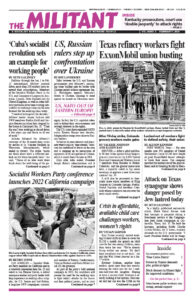HOPKINS PARK, Ill. — “Black farmers in rural Pembroke Township protest Nicor plan to build gas pipeline through their community,” read a headline in the Dec. 7 Chicago Tribune. It reported on a rally in downtown Chicago opposing the installation of natural gas service lines here, 65 miles south of the city.
But most Black farmers favor the chance to get natural gas, which can make their working and living conditions better. “The farmers aren’t against the gas line. We’ve been fighting for it for 30 years,” Pam Basu told the Militant. Her family owns the organic Basu Natural Farms. “We don’t have natural gas, we don’t have broadband access, we need these resources here.”
The village of Hopkins Park and surrounding Pembroke Township are overwhelmingly African American. Black farmers in the area have a history of fighting to defend their land and livelihoods, including opposing the construction of a prison there in the early 2000s. Basu raises herbs, apples, grapes, strawberries and various plants in the farm’s sandy soil that they mix up into natural medicine tinctures.
There are more than 70,000 farms in Illinois, according to the U.S. Department of Agriculture, but less than 200 are owned by African Americans.
Basu said the propane tanks they use for heat “cost nearly $200 and last just a week. They’re not regulated, so they can charge whatever they want.”
When the schools went “virtual” in 2020, area residents had to drive their kids to sit in the car outside McDonald’s in Kankakee, 15 miles away, to get an internet connection. “The people protesting are mostly in Chicago,” Basu said. “They benefit from access to gas.”
Her family moved to Pembroke Township in 1959. “At first we didn’t even have electricity. With the gas, they’ll start putting the lines in Hopkins Park and then spread from there. Not everyone will get it right away, but you have to start.”
Nicor says its planned gas lines will run along the roads and not take any farmland. Those opposing the pipeline have made clear their objection is to any use of fossil fuels, as opposed to “renewable energy,” regardless of where the lines are.
Supporters of the Socialist Workers Party visited Hopkins Park in December to learn more about what residents face. Many of the houses and trailers in the small town are run down. Most have propane tanks in the back for heat; some residents rely on wood stoves. A construction worker who’s lived in Pembroke Township his whole life told this correspondent that he also supports the planned natural gas line. He hopes it will bring down heating costs and attract much-needed jobs to the area.

